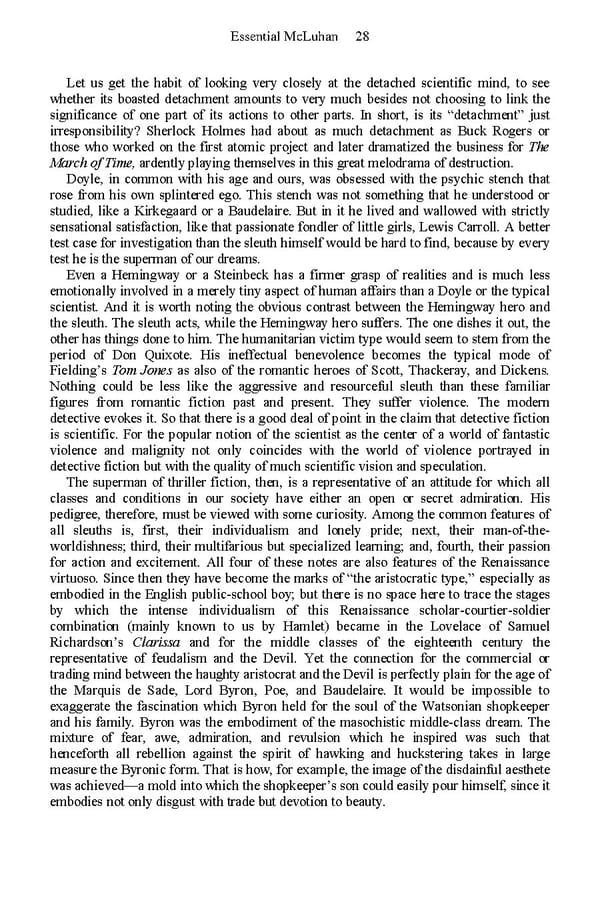Essential McLuhan 28 Let us get the habit of looking very closely at the detached scientific mind, to see whether its boasted detachment amounts to very much besides not choosing to link the significance of one part of its actions to other parts. In short, is its “detachment” just irresponsibility? Sherlock Holmes had about as much detachment as Buck Rogers or those who worked on the first atomic project and later dramatized the business for The March of Time, ardently playing themselves in this great melodrama of destruction. Doyle, in common with his age and ours, was obsessed with the psychic stench that rose from his own splintered ego. This stench was not something that he understood or studied, like a Kirkegaard or a Baudelaire. But in it he lived and wallowed with strictly sensational satisfaction, like that passionate fondler of little girls, Lewis Carroll. A better test case for investigation than the sleuth himself would be hard to find, because by every test he is the superman of our dreams. Even a Hemingway or a Steinbeck has a firmer grasp of realities and is much less emotionally involved in a merely tiny aspect of human affairs than a Doyle or the typical scientist. And it is worth noting the obvious contrast between the Hemingway hero and the sleuth. The sleuth acts, while the Hemingway hero suffers. The one dishes it out, the other has things done to him. The humanitarian victim type would seem to stem from the period of Don Quixote. His ineffectual benevolence becomes the typical mode of Fielding’s Tom Jones as also of the romantic heroes of Scott, Thackeray, and Dickens. Nothing could be less like the aggressive and resourceful sleuth than these familiar figures from romantic fiction past and present. They suffer violence. The modern detective evokes it. So that there is a good deal of point in the claim that detective fiction is scientific. For the popular notion of the scientist as the center of a world of fantastic violence and malignity not only coincides with the world of violence portrayed in detective fiction but with the quality of much scientific vision and speculation. The superman of thriller fiction, then, is a representative of an attitude for which all classes and conditions in our society have either an open or secret admiration. His pedigree, therefore, must be viewed with some curiosity. Among the common features of all sleuths is, first, their individualism and lonely pride; next, their man-of-the- worldishness; third, their multifarious but specialized learning; and, fourth, their passion for action and excitement. All four of these notes are also features of the Renaissance virtuoso. Since then they have become the marks of “the aristocratic type,” especially as embodied in the English public-school boy; but there is no space here to trace the stages by which the intense individualism of this Renaissance scholar-courtier-soldier combination (mainly known to us by Hamlet) became in the Lovelace of Samuel Richardson’s Clarissa and for the middle classes of the eighteenth century the representative of feudalism and the Devil. Yet the connection for the commercial or trading mind between the haughty aristocrat and the Devil is perfectly plain for the age of the Marquis de Sade, Lord Byron, Poe, and Baudelaire. It would be impossible to exaggerate the fascination which Byron held for the soul of the Watsonian shopkeeper and his family. Byron was the embodiment of the masochistic middle-class dream. The mixture of fear, awe, admiration, and revulsion which he inspired was such that henceforth all rebellion against the spirit of hawking and huckstering takes in large measure the Byronic form. That is how, for example, the image of the disdainful aesthete was achieved—a mold into which the shopkeeper’s son could easily pour himself, since it embodies not only disgust with trade but devotion to beauty.
 Essential McLuhan Page 34 Page 36
Essential McLuhan Page 34 Page 36